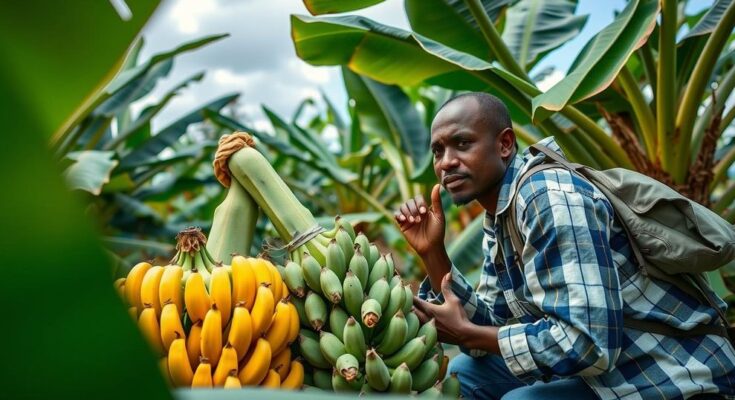The NDC Action Project, a collaboration between UNEP and UNEP-CCC, is providing Uganda’s banana farmers with innovative insurance solutions to combat the impact of climate change. Following devastating weather events that caused significant losses, farmers are trained to report crop damage digitally, enabling quicker compensation and support. The program aims to enhance the resilience of farmers while expanding to cover 50,000 individuals, helping them secure their livelihoods amidst increasing climate uncertainties.
In Uganda, banana farmers like Ahumwire Justine face increasing vulnerability due to climate change, which has significantly affected weather patterns in recent years. Justine experienced a devastating storm last October that destroyed her crops and livestock, prompting her family to consider leaving their unprotected land. The abundance of storms is attributed to climate change as per the Intergovernmental Panel on Climate Change. To address these challenges, the NDC Action Project, a collaborative initiative by the United Nations Environment Programme (UNEP) and the UNEP Copenhagen Climate Centre, has been established to enhance the resilience of farmers through innovative insurance solutions. Mirey Atallah, the Chief of the Adaptation and Resilience Branch within UNEP’s Climate Change Division, emphasized the importance of combining technical and financial tools to support smallholder farmers adapting to extreme weather. Bananas are vital to Uganda’s economic landscape, involving 47 percent of farmers in their cultivation as of 2019. They are more than just a food source; various parts of the banana plant are utilized for multiple purposes. However, farmers are now confronting erratic weather patterns, resulting in two consecutive years of excess rainfall followed by extended droughts, drastically impacting their livelihoods. The Banana Industrial Research and Development Centre, representing 5,000 banana farmers, is key to UNEP’s efforts in broadening access to crop insurance. Through training sessions, an initial group of 930 farmers learned to use smartphones to digitally report damage to their crops after severe weather events. The timely submission of these photographs enables agro-economists to evaluate the extent of loss and expedite insurance payouts, with nearly 50 percent of participating farmers being women. Partnerships with Agriculture and Climate Risk Enterprise Africa and Agro Consortium Limited have facilitated this digital insurance system, diminishing the need for traditional claims inspections, thereby accelerating payment processes. Additionally, farmers receive training in water management and agroforestry practices, which have increased yields and diminished climate-induced losses. This approach also alleviates risk for insurers and supports farmers in obtaining loans. Due to the project’s success, plans are underway to expand the insurance coverage to all 5,000 farmers associated with the research center, with aspirations to include 50,000 farmers nationwide. For Justine, this insurance scheme provides essential reassurance: “I know that if [my crops get damaged] I have help. It is not like in other years, where I would have to start from zero.” The UNEP is actively working towards achieving the Paris Agreement’s objectives of maintaining global temperature rise below 2°C, with the intent to limit it to 1.5°C. Their Sectoral Solution provides a strategic framework for mitigating emissions across diverse sectors, including agriculture and food, which is crucial in establishing climate stability.
The article addresses the pressing issue of climate change affecting banana farmers in Uganda, demonstrating the intersection of agriculture and environmental threat mitigation. As extreme weather events become more frequent due to climate change, farmers often find themselves unequipped to handle the financial repercussions of crop devastation. This situation has prompted initiatives such as the NDC Action Project by UNEP, aiming to create resilience among vulnerable farming communities through innovative insurance solutions. Moreover, bananas play a critical role in Uganda’s economy, necessitating effective strategies to safeguard this vital agricultural sector from climate-induced adversities.
In conclusion, the implementation of a novel insurance scheme in Uganda demonstrates a proactive approach to addressing the challenges posed by climate change for banana farmers. By leveraging technology and strategic partnerships, farmers can better prepare for and recover from extreme weather events, enhancing their productivity and financial security. This initiative not only supports individual farmers like Justine but also aims to stabilize a crucial sector of Uganda’s economy and contribute to broader climate resilience efforts.
Original Source: www.unep.org




